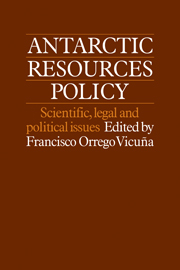Book contents
- Frontmatter
- Contents
- List of contributors
- 1 Antarctic resources policy: an introduction
- Part one The state of Antarctic knowledge and experience
- Part two The policy for the conservation of the living resources of Antarctica
- 7 Scientific and economic considerations relating to the conservation of marine living resources in Antarctica
- 8 The implementation of the Convention on the Conservation of Antarctic Marine Living Resources: needs and problems
- 9 The regime for the conservation of Antarctica's living resources
- 10 The Canberra Convention: objectives and political aspects of its negotiation
- Part three The policy for the exploration and exploitation of the mineral resources of Antarctica
- Part four Issues on Antarctica and the law of the sea
- Part five The policy for Antarctic cooperation
8 - The implementation of the Convention on the Conservation of Antarctic Marine Living Resources: needs and problems
Published online by Cambridge University Press: 06 July 2010
- Frontmatter
- Contents
- List of contributors
- 1 Antarctic resources policy: an introduction
- Part one The state of Antarctic knowledge and experience
- Part two The policy for the conservation of the living resources of Antarctica
- 7 Scientific and economic considerations relating to the conservation of marine living resources in Antarctica
- 8 The implementation of the Convention on the Conservation of Antarctic Marine Living Resources: needs and problems
- 9 The regime for the conservation of Antarctica's living resources
- 10 The Canberra Convention: objectives and political aspects of its negotiation
- Part three The policy for the exploration and exploitation of the mineral resources of Antarctica
- Part four Issues on Antarctica and the law of the sea
- Part five The policy for Antarctic cooperation
Summary
Introduction
The first Convention on the Conservation of Antarctic Marine Living Resources (CCAMLR) was ready to be put into effect after the meeting held at Hobart, Australia in May-June 1982. This Convention was associated with the Scientific Committee which has an advisory role to the Convention from scientific viewpoints. Although the establishment of the Scientific Committee could not be formally completed in June 1982, because of difficulties in getting the final agreement on the rules of procedure for the Scientific Committee, an informal meeting for discussing the substantial scientific problems for the Convention by the participating members was held between 7 and 10 June 1982 in Hobart. In the informal meeting of CCAMLR-Scientific Committee participants, five major problems to be solved for the purpose of implementing the conservation of Antarctic marine living resources were pointed out as consensus of the meeting. The five problems are as follows:
(1) Inventory of activities and information.
(2) Review of the state of the ecosystem and modelling of Antarctic ecosystem.
(3) Identification of research needs and gaps in present knowledge.
(4) Management goals.
(5) CCAMLR data base.
The four items, (1), (2), (3) and (5) are aiming to acquire a sufficiently reliable basis for managing reasonably well the Antarctic marine living resources, particularly krill, through the practically best available scheme which could be summarized by Item (4).
- Type
- Chapter
- Information
- Antarctic Resources PolicyScientific, Legal and Political Issues, pp. 119 - 138Publisher: Cambridge University PressPrint publication year: 1983
- 2
- Cited by



